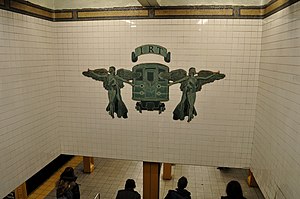Grand Army Plaza (IRT Eastern Parkway Line)
|
Grand Army Plaza
|
|||||||||||
|---|---|---|---|---|---|---|---|---|---|---|---|
| New York City Subway rapid transit station | |||||||||||

Wings for the IRT: The Irresistible Romance of Travel artwork on the mezzanine level of the station
|
|||||||||||
| Station statistics | |||||||||||
| Address | Grand Army Plaza (north side) & Flatbush Avenue Brooklyn, NY 11238 |
||||||||||
| Borough | Brooklyn | ||||||||||
| Locale | Park Slope | ||||||||||
| Coordinates | 40°40′29″N 73°58′14″W / 40.674584°N 73.970518°WCoordinates: 40°40′29″N 73°58′14″W / 40.674584°N 73.970518°W | ||||||||||
| Division | A (IRT) | ||||||||||
| Line | IRT Eastern Parkway Line | ||||||||||
| Services |
2 3 4 |
||||||||||
| Transit connections |
|
||||||||||
| Structure | Underground | ||||||||||
| Platforms | 1 island platform | ||||||||||
| Tracks | 2 | ||||||||||
| Other information | |||||||||||
| Opened | October 10, 1920 | ||||||||||
| Wireless service | |||||||||||
| Former/other names | Grand Army Plaza – Prospect Park | ||||||||||
| Traffic | |||||||||||
| Passengers (2016) | 2,425,948 |
||||||||||
| Rank | 205 out of 422 | ||||||||||
| Station succession | |||||||||||
| Next north |
Bergen Street: 2 |
||||||||||
| Next south |
Eastern Parkway – Brooklyn Museum: 2 |
||||||||||
|
|||||||||||
|
|||||||||||
Grand Army Plaza is a local station on the IRT Eastern Parkway Line of the New York City Subway. It is located in Park Slope, Brooklyn, underneath Flatbush Avenue at its northwest intersection with Grand Army Plaza. It is served by the 2 and 3 trains, the latter of which is replaced by the 4 train during late nights.
Grand Army Plaza opened on October 10, 1920 as part of the opening of the IRT Eastern Parkway Line, an extension of the Brooklyn IRT from Atlantic Avenue to Eastern Parkway – Brooklyn Museum. This extension was part of an expansion of the subway system known as the Dual Contracts which built not only IRT lines in Brooklyn but also those for the BMT. The BMT Brighton Line was already in use at the time but used trackage that is now part of the Franklin Avenue Shuttle; the opening of the subway line beneath Flatbush Avenue provided a more direct route to Downtown Brooklyn and, eventually, Manhattan.
The construction of the station and tunnels resulted in the removal of Frederic W. Darlington's 1897 Electric Fountain from the center of Grand Army Plaza, which was dug up for the cut-and-cover construction and replaced with a grass oval. Construction began on a new fountain, known as the Bailey Fountain, in 1928, and it was completed in 1932.
...
Wikipedia




